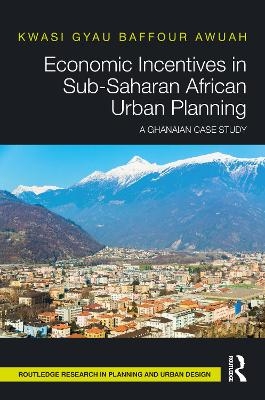
Economic Incentives in Sub-Saharan African Urban Planning
Routledge (Verlag)
978-0-367-55886-4 (ISBN)
This book explores incentives capable of enhancing the effectiveness of urban planning systems in Sub-Saharan Africa using economic theory as a framework. It argues that urban planning is fundamental to the achievement of sustainable and resilient cities, but against the backdrop of rising levels of urbanisation and growth, poverty, informal development, and climate change, such systems are failing to be promoted and successfully maintained in the region.
Across ten chapters, it analyses the connection between urban planning and socio-economic development, indicators of effective urban planning systems, and the role and influence of incentives with real-world evidence. It develops quantitative models to estimate the costs and benefits of urban planning systems, focussing on the developing world where organised data is less accessible. Using Ghana as a case study, it demonstrates a step-by-step approach on how to implement the quantitative models discussed.
Economic Incentives in Sub-Saharan African Urban Planning will be useful reading for researchers, policy-makers, development agencies, and students in urban planning, sustainable development, and economics.
Kwasi Gyau Baffour Awuah (BSc (Hons), MA, PGCAP, PhD, MGhIS, MGHACMA, MRICS, FHEA) is an interdisciplinary academic and practitioner with over 22 years of experience in international real estate/urban development projects and sustainability/sustainable development issues. Kwasi is currently an academic and the lead for the real estate research and consultancy cluster at the University of Salford, Manchester. He has occupied several positions, both in academia and in practice, and was a founding member of the International Land Measurement Standard Coalition and part of its Standard Setting Committee. Kwasi has published widely. He has been an Engineering and Physical Sciences Research Council (EPSRC) panel member and some of his works have benefitted from funding from institutions, such as the Royal Institution of Chartered Surveyors (RICS), the Department for International Development (DFID) in the UK, the European Union (EU), the Art and Humanities Research Council (AHRC), the Academy of Medical Sciences, and the Royal Academy of Engineering.
1. Sub-Saharan Africa Urban Centres and Urban Planning; 2. Justification of Urban Planning and Conceptual Basis; 3. Evaluation of the Role of Urban Planning in Socio-Economic Development; 4. Indicators of a Good Urban Planning System; 5. The Role of Incentives in Effective Urban Planning: A Conceptual Framework; 6. Sub-Saharan Africa Urban Planning Systems; 7. Influence of Incentives on Urban Planning Practice; 8. Economic Evaluation Framework; 9. Evidence from a Case Study on Provision of Incentives under a Planning System; 10. Summary, Conclusions and Proposal for Improvement; Glossary; References; Index
| Erscheinungsdatum | 23.04.2021 |
|---|---|
| Reihe/Serie | Routledge Research in Planning and Urban Design |
| Zusatzinfo | 8 Tables, black and white; 11 Line drawings, black and white; 1 Halftones, black and white; 12 Illustrations, black and white |
| Verlagsort | London |
| Sprache | englisch |
| Maße | 156 x 234 mm |
| Gewicht | 408 g |
| Themenwelt | Naturwissenschaften ► Geowissenschaften ► Geografie / Kartografie |
| Sozialwissenschaften ► Politik / Verwaltung ► Vergleichende Politikwissenschaften | |
| Sozialwissenschaften ► Soziologie ► Spezielle Soziologien | |
| ISBN-10 | 0-367-55886-6 / 0367558866 |
| ISBN-13 | 978-0-367-55886-4 / 9780367558864 |
| Zustand | Neuware |
| Informationen gemäß Produktsicherheitsverordnung (GPSR) | |
| Haben Sie eine Frage zum Produkt? |
aus dem Bereich


